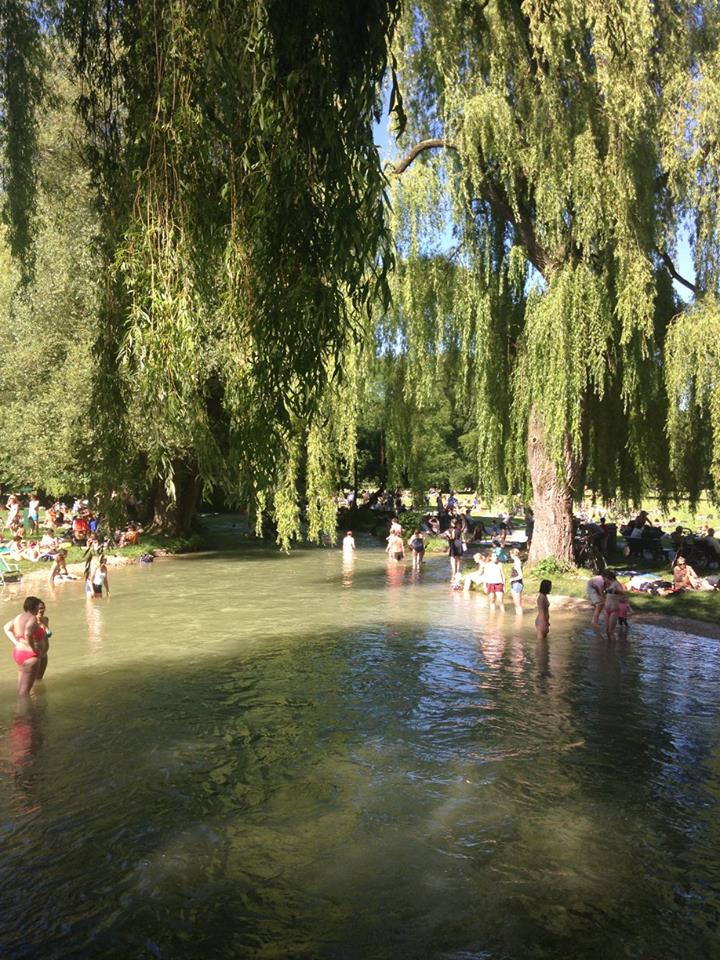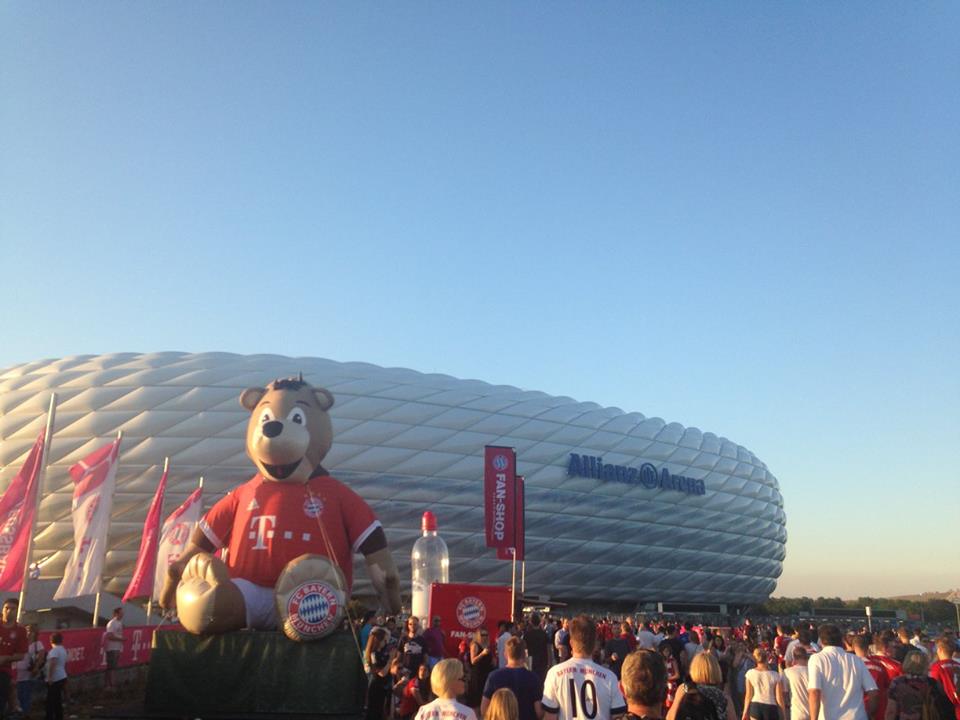Top Ten Things:
1. Try out some ice-cream parlours:
It might seem unlikely, but Munich has some of the best ice-cream parlours in Germany! One of the best and most unusual is Der Verrückte Eismacher (The Crazy Icemaker) which is decorated in an Alice in Wonderland theme and changes its flavours every day. Some of these flavours include beer, rose and champagne or mango and basil. This ice-cream parlour is also conveniently located right next to the main LMU university campus – perfect for a study break!
2. Float down the river in an inflatable pretzel:
If you’re lucky enough to be in Munich during the summer semester, as I was, one of the best things to do is buy an inflatable (this can be a normal inflatable ring, or in my case, an inflatable pretzel) and float down the streams and rivers that go through the English Garden. This is very popular with students in Munich and one of the best ways to cool off when the weather is hot.

3. Find the surfers in the park:
Another quirky thing to do in the English Garden is to go and watch surfers at one of the numerous spots in the park. It’s very surprising when you suddenly come across waves and surfboards in the middle of a German park, but definitely worth looking out for!
4. Take in a view of the city centre:
It may take nearly 300 steps to reach the top, but the view from St Peter’s Church in the city centre is unmissable – plus it only costs €1 for students! The time spent walking up the stairs will definitely be worth it and if you’re lucky, you may even be able to see the Alps! Munich also has plenty of rooftop bars, where you can enjoy cocktails and get a great view over the city centre at the same time.

5. Immerse yourself in Bavarian culture:
One of the best things about Munich is how proud it is of its culture. While in Munich, there are plenty of ways to discover the city’s culture. One of the events that I went to was called the Kocherlball, which takes place once a year in July in the English Garden. The hard-core Bavarians arrive at 2am to reserve their tables, but most people arrive around 6am. Traditionally the Kocherlball was a way of servants to be able to enjoy themselves before they started work. Nowadays, people dress up in traditional clothing of Lederhosen and Dirndls, and listen to a band play traditional music. Not forgetting of course another traditional Bavarian thing to do – Oktoberfest! An alternative for those who aren’t in Munich during Oktoberfest is its little sister, Frühlingsfest, which takes place in spring.
6. Venture out of the city:
Munich is lucky enough to be in a great position in Europe, making it very easy to reach other places in Europe. There are also so many places to visit within an hour or so of Munich. Some of the best places to spend a sunny afternoon are the lakes south of the city, such as Lake Starnberg. The transport system is very efficient and cheap in Munich, making it very easy to get to the lakes, and also to the mountains.
7. See a football game:
It may be stereotypical, but when living in Munich, it is a must to go to the Allianz Arena and watch a game. Ideally it is best to see Bayern Munich play, but the lower team TSV 186 also play there, and offer cheaper tickets.

8. Go food shopping at the Viktualianmarkt:
In the centre of Munich there is the Viktualianmarkt, a daily food market with over 140 stalls, offering everything from cheese, to fresh fruit juices, and also a beer garden. There are also lots of restaurants in the area to grab some lunch, and it is rumoured that this is where the Bayern Munich football players go food shopping…
9. Experience art and history:
If culture is your thing, Munich has a huge number of museums and art galleries to cover all interests. This includes museums on the history of Munich itself, such as the recently opened National Socialist Documentation Centre, which displays Munich’s involvement in the Nazi regime. A useful tip is that most art galleries and museums offer discounts for students, and are either free or discounted on Sundays. A trip to Neuschwanstein castle is also an absolute necessity when in Bavaria.

10. Indulge in Bavarian cuisine:
Many people may have stereotypes about Bavarian food and these do often prove to be true, but Munich also has restaurants offering food from all around the world. One of my favourite places for a quick bite to eat is Condesa, a cheap but delicious Mexican restaurant. Don’t be put off by the stereotypes about Bavarian food however – it is definitely worth trying!
Studying:
Before going to Munich, I had to fill in a learning agreement to send to the university. As the module catalogue for the summer semester had not yet been released, I had to do this from the previous semester’s catalogue. This was useful to get an idea of the courses that were offered at LMU, but it did mean that I had to choose my modules again upon arriving in Munich. At German university, there are different types of classes. A Vorlesung is the same as a lecture at King’s, where the lecturer stands at the front and the students take notes. The assessment for this is often a Klausur, which is an in-class written exam at the end of the semester. This can vary however, as for one of the Vorlesung classes I took, I had to do an oral exam with other international students, and for another Vorlesung, I had to submit a portfolio of my lecture notes. German university also has seminars, at different levels called Proseminars and Hauptseminars, with Hauptseminars being at a higher level. I took one Proseminar, and the assessment for this was an in-class group presentation. In terms of signing up for courses, for a seminar it is necessary to sign up in advance, by emailing the seminar leader. For lectures, it was not necessary to sign up in advance, but instead to just tell the lecturer at the start or end of the first lecture that you are an Erasmus student and would like to enrol in the course. For the exams, Erasmus students normally have to send another email to make sure they are registered for the exams. I found the pace of classes mostly easy to follow, and also all students I came across were very helpful!

Accommodation and student life:
From my experience, most Erasmus and international students in Munich lived in student accommodation, as I did. I applied for this during my application for the university in Munich – it was as simple as just ticking a box and saying that you’d like to be considered for student accommodation. The two main student accommodation complexes in Munich were called Studentenstadt (student town) and the Olympisches Dorf (Olympic Village). I was lucky enough to get a place in the Olympic Village, which is considered to be the best place for students to live in Munich. As the name suggests, this accommodation complex is where the athletes lived during the 1972 Munich Olympics. The accommodation is split into blocks with studio apartments, and then bungalows. I was lucky enough to live in a bungalow, which was totally self-contained with a kitchen and bathroom downstairs, and then the bedroom and a balcony upstairs. As an international student, I got a ‘service package’ which included a sleeping bag, pillow and sheet. There was also a Facebook group where people who were moving out of the village sold household appliances, kitchen equipment etc., so that was a great way to buy items quite cheaply, and also to sell things before moving back to the UK. In terms of WIFI, an Ethernet cable was provided, but for WIFI I bought a router from the IT office at the accommodation, who set it up ready to be used in my bungalow.
Although I lived on my own in the bungalow, the bungalows were organised into streets, so I had lots of neighbours who were all very friendly so it was easy to make friends. The good thing about student accommodation in Munich was that it was not just people from LMU, where I was studying, but also the other university in Munich. Therefore there was a great mix of German and international students, and lots of opportunities to meet people, and I never felt lonely despite living on my own. Living in student accommodation was also a nice change from living in private housing in London, as there was a really great student environment. As well as being student accommodation, the Olympic Village also had a laundry room on site, a study room/library, and various student advice offices. Best of all, there was an on-site pub that served food, a cocktail bar and a disco, all just for the students. A few minutes’ walk away was a shopping centre with a Tengelmann supermarket, bakeries, restaurants, pharmacies and a post office. The U-Bahn station was also just a few minutes’ walk from the residence and it was just 10 minutes to get into the centre of Munich.
Even though Munich is known as the most expensive city in Germany, it is relatively cheap compared to London! My rent was around €300 per month and this also included electricity and water bills. Upon enrolment, you receive a student card which also acts as a travel ticket for the Munich transport system, but only for evenings and weekends. For a one-off fee of around €150, I decided to buy an unlimited ticket that I could use at any time, on any day of the week, throughout the semester. This was great as it meant I never had to buy a ticket, and also the Munich transport network can take you quite far out of the city, such as to the lakes.
Mensas are another great thing about being a student in Munich. A Mensa is a student canteen that offers really cheap, but actually really tasty food! In Munich, you need to buy a Mensa card for a deposit of €7, which you can then top up with money as and when you need to. The largest Mensa in Munich is at Leopoldstraβe, which offers a wide range of German food, Bavarian food and also a few international dishes each day.
Reflections:
Before choosing where I wanted to study abroad for the German part of my degree, I did not really know a lot about Munich, however after having spent a semester there, I am so glad to have picked it! One of the best things about my experience in Munich was the buddy system run by the university, where international students are paired up with German students. I was really lucky with my buddy, who showed me all the best things in Munich and introduced me to all of her friends, meaning that I was really able to integrate into German culture. Munich is a big enough city to offer endless things to do, but also small enough to feel friendly and welcoming – it is not surprising that it is referred to as having a village feel. The city was also in a perfect location for discovering Bavaria and also beyond Germany’s borders. I found LMU as a university to be a fantastic place to spend a semester studying. The classes I took were challenging and stimulating, but there was always support offered in case of problems. This semester allowed me to improve my German immensely, and I think this was mainly due to how friendly and welcoming fellow students were. I would definitely recommend studying abroad in Munich!

